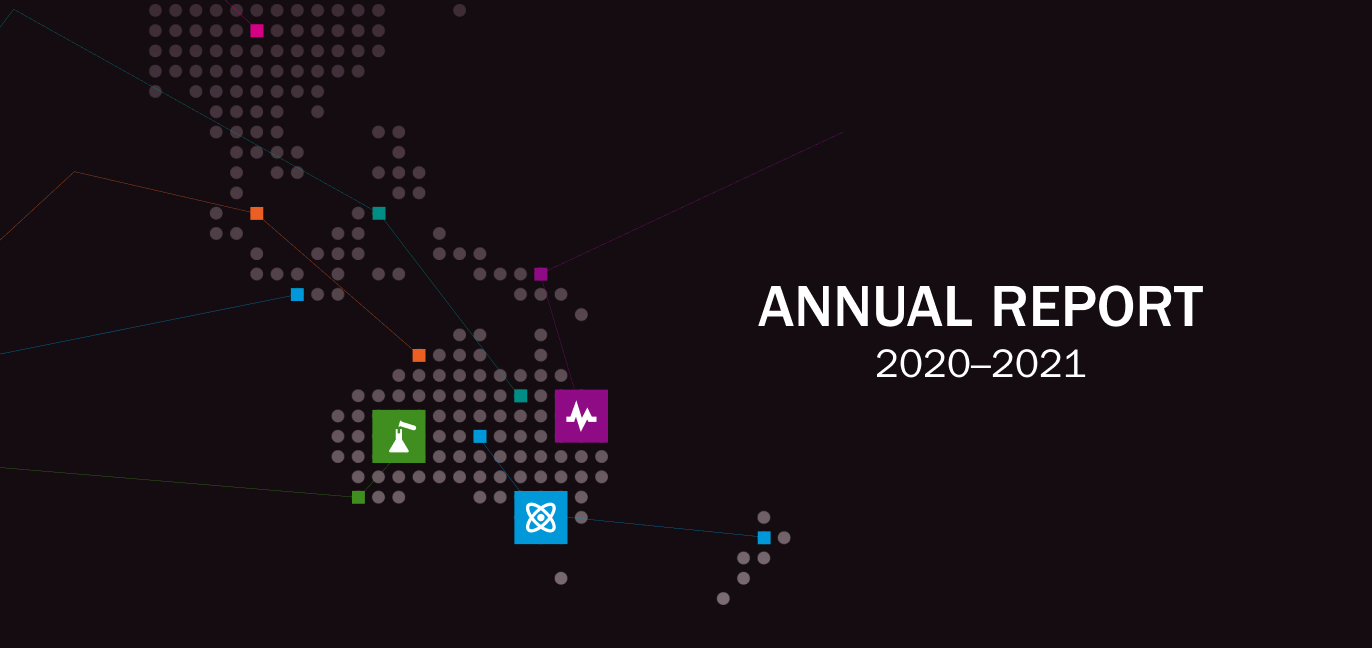ASNO Annual Report 2020-21
This report complies with the formal reporting obligations of the Director General ASNO. It provides an overview of ASNO's role and performance in supporting nuclear safeguards and the non-proliferation of weapons of mass destruction.
Publication details
PRODUCED BY
Director General ASNO
Australian Safeguards and Non-Proliferation Office (ASNO)
RG Casey Building, John McEwen Crescent
BARTON ACT 0221, Australia
PHONE +61 (2) 6261 1920
MEDIA +61 (2) 6261 1555
asno@dfat.gov.au
http://www.dfat.gov.au/asno
http://www.dfat.gov.au/international-relations/security/asno/pages/annual-reports
ISBN
Book (softcover) – 978–1–74322–579–0
PDF document – 978–1–74322–580–6
Word document – 978–1–74322–581–3
CREATIVE COMMONS
With the exception of the Commonwealth Coat of Arms and where otherwise noted (including photographs protected by copyright), this report is licensed under a Creative Commons Attribution 3.0 Australia licence. http://creativecommons.org/licenses/by/3.0/au/.
The report should be attributed as the Australian Safeguards and Non-Proliferation Office Annual Report 2020–2021.
USE OF THE COAT OF ARMS
The terms under which the Coat of Arms can be used are detailed on the It's an Honour website. https://www.pmc.gov.au/government/its-honour.
Guide to the report
This report complies with the formal reporting obligations of the Director General ASNO. It provides an overview of ASNO's role and performance in supporting nuclear safeguards and the non-proliferation of weapons of mass destruction.
The report has five parts:
- report by the Director General ASNO on key developments in 2020–21 and a preview of the year ahead
- a review of selected topics in ASNO's work
- functional overview of ASNO, including its operating environment and outcomes – outputs structure (the first outcome demonstrates accountability to Government, and the second outlines public outreach and education)
- report on ASNO's performance during 2020–21 and
- key features of ASNO's corporate governance and the processes by which ASNO is directed, administered and held accountable.
As ASNO is funded as a division of the Department of Foreign Affairs and Trade (DFAT), some mandatory annual report information for ASNO is incorporated in the DFAT Annual Report. This includes:
- financial statements
- corporate governance and accountability framework
- external scrutiny
- human resource management, including work health and safety
- asset management
- purchasing
- agency-specific social inclusion strategies
- advertising and market research and
- ecologically sustainable development and environmental performance.
List of Figures
- Figure 1: Location of the ERA Ranger Mine in the Northern Territory.
- Figure 2: Quantity and value of Australian UOC (U3O8) exports from 2010–11 to 2020–21
- Figure 3: Civil Nuclear Fuel Cycle
- Figure 4: Australian Safeguards and Non-Proliferation Office's Operating Environment
- Figure 5: Data availability for Australian IMS radionuclide monitoring stations in 2020–21. Green indicates the percentage of data that was available for each month.
List of Tables
- Table 1: UOC (U3O8) export and nuclear electricity statistics
- Table 2: ASNO’s Outcomes and Outputs Structure
- Table 3: Material Balance Areas (MBAs) in Australia for IAEA safeguards purposes
- Table 4: Number of line entries in inventory and inventory change reports submitted by ASNO to the IAEA for each MBA
- Table 5: ASNO Number of line entries (by report type) submitted by ASNO to the IAEA across all MBAs
- Table 6: Nuclear Material in Australia at 30 June 2021
- Table 7: Associated Items2 in Australia at 30 June 2021
- Table 8: Number of entries made under the Additional Protocol
- Table 9: Status of Permits and Authorities under the Safeguards Act at 30 June 2021 and Changes in the Reporting Period
- Table 10: Main classes of Permits and Authorities
- Table 11: IAEA Safeguards Inspections 2020–21
- Table 12: Inventory Differences Recorded during 2020–21
- Table 13: Distribution of Permits Holders according to security category
- Table 14: Summary of net accumulated AONM by category, quantity and location at 31 December 2020
- Table 15: Supply of Australian uranium by region during 2020
- Table 16: Summary of AONM Transfers during 2020
- Table 17: The total quantity of FONM in Australia (by category) from all partner countries as of 31 December 2020
- Table 18: Permits for CWC-Scheduled Chemical Facilities
- Table 19: DPRK Nuclear Test Explosions
- Table 20: ASNO Staff at 30 June 2021
- Table 21: Training and Development Activities during 2020–21
- Table 22: ASNO Administrative Costs
- Table 23: ASNO Regulatory Performance Framework Metrics 2020–21
- Table 24: Australia's Nuclear Cooperation Agreements at 30 June 2021


